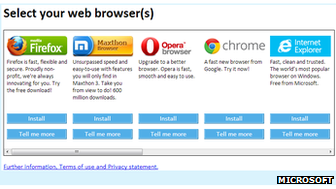Microsoft fined by European Commission over web browser
- Published

Microsoft has reintroduced the browser choice facility after being alerted to the fact it was missing
Microsoft has been fined 561m euros ($731m; £484m) for failing to promote a range of web browsers, rather than just Internet Explorer, to users in the European Union (EU).
It introduced a Browser Choice Screen pop-up in March 2010 as part of a settlement following an earlier EU competition investigation.
But the US company dropped the feature in a Windows 7 update in February 2011.
Microsoft said the omission had been the result of a "technical error".
But competition commissioner Joaquin Almunia said the action was unprecedented, adding he wanted to deter any company from the "temptation" of reneging on such a promise.
In theory the watchdog could have fined the firm 10% of its global annual revenue, which would have totalled $7.4bn based on its 2012 report.
"We take full responsibility for the technical error that caused this problem and have apologised for it," a spokesman for Microsoft said following the announcement.
"We provided the Commission with a complete and candid assessment of the situation, and we have taken steps to strengthen our software development and other processes to help avoid this mistake - or anything similar - in the future."
One lawyer said the ruling was also intended to send out a message to others.
"The European Commission is sending a firm signal in this first case of its type that it will not tolerate failure by a company to comply with the commitments it gave to settle an antitrust infringement procedure," said Tony Woodgate from Simmons & Simmons.
Joaquin Almunia, vice-president of the European Commission, announced the fine
"These 'commitments decisions' are currently the European Commission's favoured mechanism to close abuse of dominance proceedings, saving enforcement resource and allowing for a speedy resolution."
Browser 'oversight'
The case dates back to 2007 when Opera - a Norwegian web-browser maker - complained Microsoft was stifling competition on PCs by bundling Internet Explorer with its operating system.
Microsoft initially argued that the move benefited users, but after the European Commission issued a preliminary report suggesting the firm had abused its position, the company agreed to offer a choice of browser until at least 2014 to avoid risking a fine.
However, this option was missing from its Windows 7 Service Pack 1 released in 2011 and it continued to be absent for 14 months.
During that time, Microsoft reported it was still complying with the agreement.
After the EU was alerted to the problem, it contacted Microsoft, which subsequently issued an apology suggesting its engineers had accidentally missed the issue.
It also acted to restore the facility. But the move was not enough to prevent an eight-month follow-up investigation by the commission into what punishment was needed.
Warning to others
At a press conference in Brussels, Mr Almunia said Microsoft's lack of compliance represented a "serious breach" and was the first time a firm had failed to meet such a commitment.
He explained that he preferred negotiated settlements, rather than extended legal battles, when tackling competition complaints in the fast moving IT sector.

The Windows 7 update error helped cause the firm's chief executive's bonus to be cut
But he added that Microsoft's willingness to co-operate with the EU's subsequent investigation had acted as a mitigating factor when determining the level of the fine.
"I hope this will make companies think twice before they ever thinking of breaching their international obligations," said the commissioner.
Microsoft's chief executive Steve Ballmer and the former head of its Windows division Steven Sinofsky have already had their most recent bonuses docked, in part because of the browser affair.
Opera told the BBC it was "happy to see that the Commission is enforcing compliance with the commitment, which is critical to ensuring a genuine choice among web browsers for consumers".
However, one industry watcher suggested there were still unresolved issues,
"While it's highly likely that it was a technical mistake that broke the browser choice facility the fact that it remained broken for 14 months raises significant questions about Microsoft's ability and willingness to comply with the voluntary agreement with the EU," said Chris Green, principal analyst at the consultants Davies Murphy Group Europe.
"At the same time the situation also raises concerns over the EU's ability to actually monitor the outcomes of antitrust agreements."
- Published6 March 2013
- Published24 October 2012
- Published17 July 2012